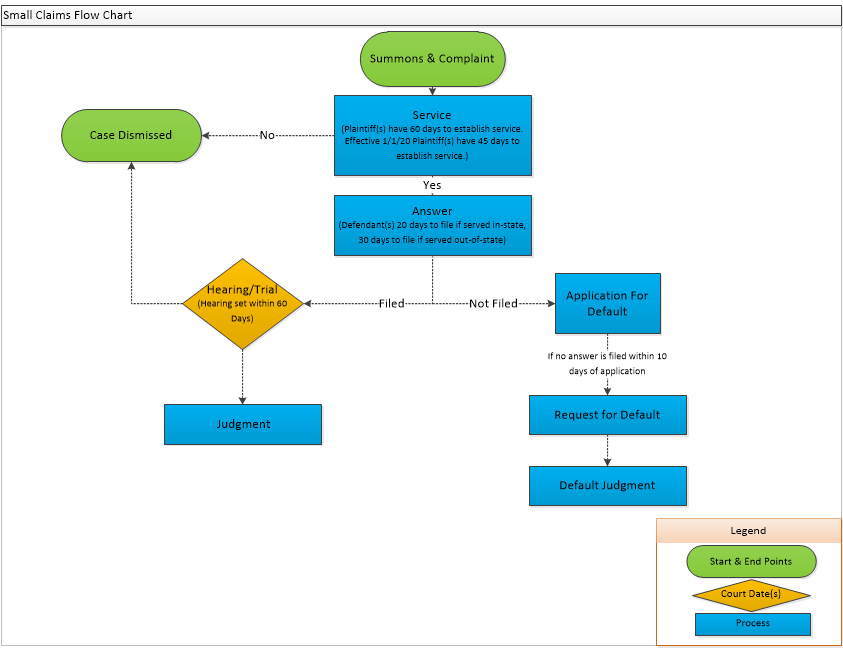- Introduction
-
Claims in which the amount sought is not more than $5,000, exclusive of court costs can be filed in Small Claims Court. Typically, parties are not represented by attorneys and cases can be heard relatively quickly and inexpensively. A small claims case cannot be heard before a jury. The hearing officer's decision is final and not appealable. [Please note: if you believe you are entitled to damages greater than these monetary limits, but decide to sue in Small Claims Court, you give up your right to recover damages over the $5,000 limit. The additional money cannot be claimed later in a separate lawsuit.]
- How to File
-
The Court provides the necessary forms with detailed information and instructions.
Click on the links below to view the forms:
CVSCPK1 - Small Claims Plaintiff Packet
The Court also has a webpage to start the small claims process online. To start a small claims case on the website, click here: Small Claims E-File.
Filings may be subject to a fee according to the Civil Fee Schedule. If you cannot afford the fees you may apply for a Deferral or Waiver.
- Case Flow Chart
-
- Common Case Terms & Definitions
-
Complaint - A formal allegation that initiates a lawsuit.
Creditor - One to whom a debt is owed.
Debtor - One who owes an obligation to another.
Default Judgment - A judgment entered against a defendant who has failed to plead or otherwise defend against a plaintiff's claim.
Defendant - A person being sued in a civil proceeding.
Garnishee - A third party who is served a notice by a court to surrender money for the settlement of a debt or claim.
Garnishment - a process that involves a court order to direct that money from a third party (employer or bank) be seized to satisfy a debt owed by a debtor to a plaintiff creditor.
Judgment - A formal decision made by a court.
Plaintiff - A party who brings a civil suit in a court of law.
Service - The formal delivery of a legal notice.
Summons - Provides legal notice to a party about a lawsuit and may involve an order to appear and or response to the complaint. - FAQ's
-
-
Is there a fee to file a small claims case?
- Yes, per the Civil Fee Schedule a fee is required to file the complaint with the Court.
-
I was served with a Small Claims Summons and Complaint. Now what do I do?
- Per the Rules of Civil Procedure an answer must be filed within 20 days from the date the complaint was served. If a party was served out of state, then an answer must be filed within 30 days from the date the complaint was served. If an answer isn't filed in the time frame specified, the plaintiff(s) can request a default judgment.
-
Can I be represented by an attorney in a small claims case?
- Attorneys are not allowed to represent a party in small claims cases. However, parties may agree to the use of an attorney.
- You may file a request to transfer your case to regular civil as attorneys are allowed in regular civil cases. There is a fee to transfer a small claims case to regular civil per the Civil Fee Schedule.
-
What is the difference between a small claims case and regular civil case?
- In small claims:
- The principle amount for the claim sought cannot exceed $5,000.00
- There are no attorneys
- There is no disclosure process
- There is no appeal process
- No motions can be filed
-
Is there a fee to file a small claims case?
- Appeal Process & Information
-
A party may not appeal a final order or a final judgment entered in any small claims case.
- Other Information
-
There are specific types of cases that cannot be filed in Small Claims Court. These include:
- Seeking injunctive relief by requiring a party to refrain from doing or continuing to do a particular act.
- Ordering someone to complete an action or specific performance.
- A claim of defamation, libel or slander.
- Action brought or defended on behalf of a class.
- Request for or involvement of prejudgment remedies by enforcing or redressing an injury before judgment.
- Forcible entry, forcible detainer or unlawful detainer (eviction).
- Action against the state, its officers or employees of any city, county, or other political subdivision in their capacity and damages sought.
-
AZCourtHelp.org:
AZCourtHelp.org offers free assistance to all people who have legal information questions or need assistance in resolving disputes.
Click below for more information:

